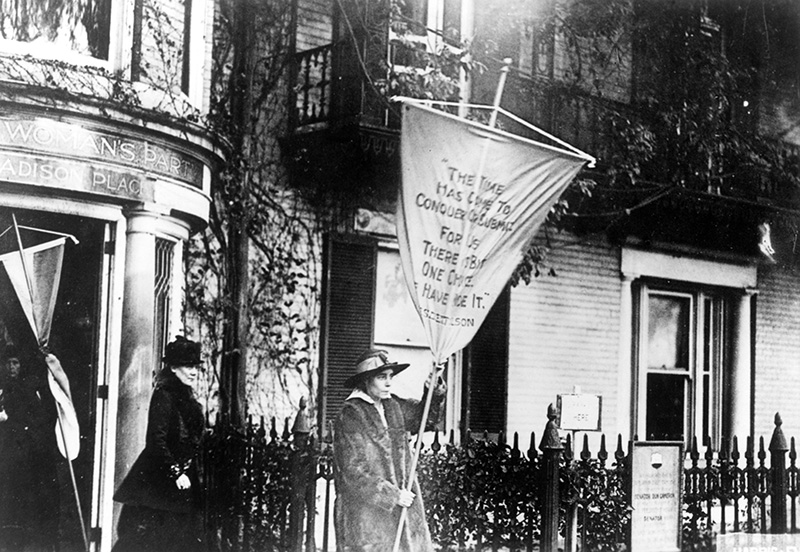NPC in History: Gram Robinson, women’s suffrage and the Women’s National Press Club

National Women’s Party leader Alice Paul emerges from the Lafayette Square headquarters holding a banner that hurls President Wilson’s World War I rallying cry back at him. It is a Wilson quote that reads: “The time has come to conquer or submit. For us there is but one choice. We have made it.” Photo: Library of Congress
At 21, Alice Gram Robinson was arrested while protesting for women’s suffrage in front of the White House, held at the Occoquan Workhouse where she took part in a hunger strike, and two years later helped found the Women’s National Press Club before launching a six-decade Washington journalism career.
Her story connects this week's centennial celebration of the 19th amendment's passage to the National Press Club because the club she founded later merged with the NPC.
And her story joins that of the Women’s National Party, led by Alice Paul, which set as its goal forcing President Woodrow Wilson to support a women’s suffrage constitutional amendment by keeping continual demonstrations in the news. Paul literally invented the White House protest as suffragists emerged from their headquarters on Lafayette Square to picket the White House with banners promoting suffrage and condemning Wilson hypocrisy.
Especially after the United States entered World War I in April 1917, banners calling the president “Kaiser Wilson” drew the ire of counter protestors who saw the suffragists as disloyal. Even as the women were assaulted and their banners shredded, they kept coming back. Over the course of months, the continuous protests led to arrests by D.C. police.
Gram Robinson took part in those protests. Born of Danish immigrants, she grew up in Portland, Ore. Entering the University of Oregon in 1914, she was drawn to the women’s suffrage movement. She and her sister traveled to Washington in 1917 to take part in the demonstrations.
According to an account by Katie Pratt, a student at Simmons College, Robinson was in the third wave of suffrage protestors on Nov. 10 to emerge from the headquarters to head for the White House.
“The pickets walked all together this time twice up and down in front of the White House in a brave line, and then stood in position against the high iron fence, stretching from gate to gate. They stood on guard for several minutes before the startled police gathered their forces and bundled them into commandeering car,” Pratt quoted from an article that appeared in the Suffragist.
Like most suffragist demonstrators, Robinson chose a jail sentence instead of paying a fine and was sentenced to 30 days in the Occoquan Workhouse in Virginia. There she was part of the suffragists’ hunger strike, demanding that they be considered political prisoners. Weak from the ordeal, Robinson was part of a full presidential pardon in late November as the country moved slowly toward passage of the 19th amendment through Congress in June 1919, winning the necessary approval of three-quarters of the states on Aug. 18, 1920.
Of the six founding members of the Women’s National Press Club, three –Florence Boeckel, Eleanor Nelson and Robinson -- were publicists for the National Women’s Party and three were Washington correspondents for out-of-town newspapers – Cora Rigby, Christian Science Monitor bureau chief; Carolyn Vance Bell, a syndicated feature writer for the Newspaper Enterprise Association; and Elizabeth King of the New York Evening Post.
They believed they had to create a women’s club because the National Press Club was men-only, yet it was the source of a lot of news in Washington. Women were not admitted as members until 1971. The women’s club changed its name to the Washington Press Club, and it merged with the NPC in 1985, combining their histories.
The three publicists had created something new after World War I, a public relations firm, according to Club member Maureen Beasley’s book “Women of the Washington Press: Politics Prejudice and Persistence.” The first meeting of the six founding members took place in their office.
Robinson’s work with the suffrage movement and her effort to launch the Women’s National Press Club drew her to journalism, first as a contributor to a number of magazines including Good Housekeeping. In 1921, she founded The Congressional Digest, a magazine geared to new women voters that explained complex congressional legislation with an eye toward bills that affected women and children.
Her husband, Norborne T.N. Robinson, a writer for the Buffalo Evening News, was a founder of the National Press Club in 1908.
Gram Robinson ran the Digest until she retired in 1983 shortly before dying of cancer early the next year.
NPC in History is a feature of the Club’s History and Heritage team chaired by Club historian Gil Klein. He is the author of “Tales from the National Press Club,” published in April by The History Press.
